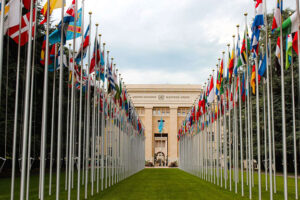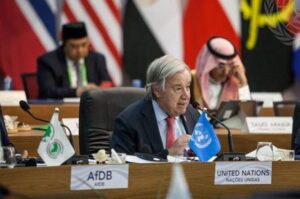
Civil Society, Democracy, Global, Global Governance, Headlines, Human Rights, International Justice, IPS UN: Inside the Glasshouse, TerraViva United Nations
Gina Romero is UN Special Rapporteur on the rights to freedom of assembly and of association

Gina Romero
– The U.S. administration has the prerogative to review and adjust public expenditure policies, including foreign aid. However, this power must be exercised responsibly, adhering to national and international legal frameworks, including the principles of human rights law.
The recent decisions by the Trump administration to freeze federal grants and loans, including foreign aid, have raised serious concerns about the implications for local, national and international associations.
These measures, which followed executive orders aimed at “reevaluating” U.S. foreign assistance and terminating diversity, equity, and inclusion (DEI) programs, risk undermining the freedoms that are vital to democratic societies.
In a letter sent to the USG, 35 UN experts indicate that the freeze on funding and stop work orders has been described as a drastic measure that could have a far-reaching impact on the ability of individuals and organizations to advocate for and protect human rights.
The decision to stop work on federal projects, including critical programs funded through foreign aid, is having an immediate effect on vulnerable communities and human rights defenders worldwide. The ripple effects are particularly severe for marginalized groups who depend on these resources for essential services like healthcare, education, access to food and housing.
These measures also disproportionately affect organizations working on gender equality, LGBTIQ issues, reproductive rights, and poverty alleviation, which are already underfunded and face significant challenges in the global South.
The implications of these measures affect different type of associations, including small and medium-sized businesses, not-for-profit entities, civil society organizations, universities, faith-based groups, and even scientific research institutions that rely on U.S. funding to carry out their work.
The speed and scale of the funding freeze have left these entities unable to fulfil their missions. Some have already been forced to lay off staff, suspend vital programs, and even close their doors, leading to the shrinking of civic space in countries where they have long been key players in advocating for democracy, human rights, and sustainable development.
The Need for Proportionality, Transparency, and Legal Compliance
While the goal of effective public expenditure is commendable, its success depends on a transparent and inclusive process that is in line with legal standards, including international human rights law. These measures, which were implemented with little consultation or clear communication, have not adhered to the principle of proportionality, which is enshrined in both domestic and international law.
The absence of transparent guidelines, accountability mechanisms, respect for due process, and avenues for appeal is troubling, especially when the measures have such wide-reaching consequences.
International human rights law, including the International Covenant on Civil and Political Rights (ICCPR), to which the United States is a signatory, guarantees the right to freedom of association. This right not only protects the ability to form associations but also to carry out the activities for which those associations were established.
The freedom to access resources is a critical component of this right, as it enables organizations to seek, receive, and use resources from a variety of sources, both domestic and international. When funding is denied, it effectively denies organizations the means to operate, undermining their ability to fulfil their missions.
The freeze on U.S. funding, without due process or clear guidelines, is in direct conflict with these principles. The lack of clarity on how decisions are made or how organizations can challenge them undermines the rights of associations.
Furthermore, the failure to involve stakeholders—including U.S. civil society organizations—in the decision-making process is a violation of the principles of democratic governance and transparency.
The Global Impact of U.S. Funding Decisions
The far-reaching consequences of the funding freeze are most acutely felt in countries where U.S. aid supports critical initiatives in areas such as healthcare, education, peacebuilding, and human rights protection.
For example, programs addressing sexual and reproductive health are at immediate risk of cessation. Similarly, efforts to combat gender-based violence, support displaced communities, and provide education to marginalized groups are being disrupted.
In addition to these humanitarian concerns, the freeze also threatens to derail long-standing initiatives aimed at promoting democracy, good governance, and the rule of law. U.S. foreign aid has long been a pillar of support for civil society organizations that monitor elections, promote anti-corruption efforts, and advocate for human rights protections, among others.
The suspension of funding to these programs undermines not only the work of these organizations but also the broader goal of promoting democratic values worldwide.
The U.S. government’s decision to cut funding to programs that address discrimination—particularly those related to DEI initiatives—has sparked additional controversy. These measures have the potential to undermine efforts to protect individuals from workplace discrimination and ensure equal access to opportunities.
By targeting DEI programs, the administration is signalling a shift away from policies designed to address structural inequalities, which could have long-term negative effects on social justice worlwide.
The Stigmatization of Civil Society Organizations
Another concerning consequence of these decisions is the stigmatization of associations managing and receiving U.S. funding. The administration’s rhetoric has painted many civil society organizations as threats to national security.
This kind of stigmatization is dangerous because its fosters hostility toward groups that are engaged in legitimate advocacy for development, human rights and democratic governance.
Also, it places these organizations—and their staff—at risk of harassment, intimidation, and even physical violence, particularly in countries where civil society organizations are already under threat. Stigmatization is the entry door for repression and violence.
This pattern of vilification has serious consequences. As I noted in my more recent report to the UN General Assembly, negative narratives about civil society organizations and other associations deepen the stigmatization of activists and organizations, leading to increased repression, physical attacks, and online harassment.
These dynamics create an environment in which activists and civil society organizations are seen not as contributors to public good but as enemies.
The Path Forward: Upholding Human Rights and Civil Society
The decision to freeze funding may have been motivated by a desire to ensure more effective public spending, but it risks doing lasting damage to civil society. The lack of transparency, failure to follow due process, and disregard for international human rights law make these measures problematic.
To ensure that the U.S. upholds its commitment to human rights and the freedom of association, it is imperative that the U.S. government must urgently comply with the recent court orders, pay invoices, reconsider the impact of its freeze on foreign aid and federal grants and to compensate for the damage done. Besides, future decisions regarding foreign aid and public funding be made with greater clarity, accountability, and respect for the rule of law.
The U.S. must also recognize that associations in general and civil society organizations in particular are critical to the realization of human rights. These organizations play an essential role in advocating for the protection of fundamental freedoms, including the rights to health, education, and social justice.
Freezing funding and issuing stop work orders without clear and transparent procedures not only undermines these organizations but also threatens to dismantle vital systems of support for marginalized communities.
It is crucial that the U.S. government ensures that future funding decisions are made with respect for international human rights standards, that organizations are able to access the resources they need to carry out their work, and that the right to freedom of association is upheld.
In conclusion, the freeze on U.S. funding represents a significant threat to the functioning of civil society organizations and to the protection of human rights globally. While the government’s decision to review public expenditure is within its rights, the approach taken thus far raises serious concerns about transparency, proportionality, and adherence to international human rights law.
To avoid further harm, the U.S. must prioritize the protection of civil society, uphold the right to freedom of association, and ensure that any policy changes are made in a manner that respects the fundamental freedoms on which democracy depends.
IPS UN Bureau











